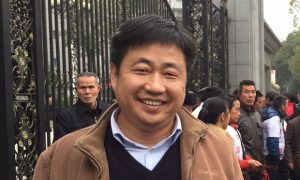China accuses western media of fake news about human rights

The Guardian, 3 March 2017

By Tom Phillips — China has launched a Donald Trump-style attack on foreign media, branding claims that a leading human rights lawyer was tortured by government agents fake news.
Xinhua, the government’s official news agency, accused the overseas media of “hyping” a series of “cleverly orchestrated lies” by publishing reports about the plight of attorney Xie Yang, who was detained in July 2015 at the start of a crackdown known as China’s war on law.
Reports about Xie’s alleged torture by security agents surfaced on overseas human rights websites late last year. More detailed accounts of similar claims subsequently appeared in newspapers including the Guardian, the Wall Street Journal, the New York Times and Japan’s Asahi Shimbun.
Experts said the allegations, while impossible to verify, were consistent with abuses previously documented by human rights groups.
On Thursday, however, China’s Communist party-controlled media launched unusually pointed criticism over the claims that Xie had been abused, directing its ire against four articles published by overseas websites focused on human rights in October and November 2016.
Investigations reveal "torture stories" about Chinese lawyer Xie Yang are nothing but cleverly orchestrated lies
— China Xinhua News (@XHNews) March 1, 2017
Xinhua’s English-language rebuttal of those torture allegations said: “The stories were essentially fake news.”
It alleged the reports had been “entirely fabricated” by Jiang Tianyong, another prominent human rights lawyer who disappeared last November after being seized by police.
An unverified Twitter account believed to belong to the state council information office, the propaganda arm of China’s cabinet, tweeted a link to Xinhua’s article with the message:
It seems to be a fashion for some to believe those imagination & prejudice-based "torture stories". https://t.co/Yb0AN5oIkx
— China SCIO (@chinascio) March 2, 2017
Xinhua claimed an independent team had been sent to investigate claims of Xie’s mistreatment and concluded the “so-called torture did not happen”.
Its reporters, who were given access to both detained men, claimed Xie said he was in good physical condition and was being treated well by prison guards who were giving him nine hours’ sleep each day and “decent food”.
The Southern Metropolis Daily newspaper claimed Jiang had encouraged Xie’s wife, Chen Guiqiu, to invent the torture claims.
It alleged she did so believing that once such information was handed to foreign diplomats and reporters it would “spread like wildfire”. Foreign journalists were “great enthusiasts” for negative stories about the Chinese government and saw information about torture, human rights issues and the rule of law as “treasure”, it added.
David Bandurski, an expert on Chinese journalism from the University of Hong Kong, said Beijing had long used the concept of fake news (jia xinwen) to discredit reporting it did not approve of.
“Fake news has been an accusation levelled at western media coverage of China for many, many years,” he said, pointing to a 2009 article in Seeking Truth, the Communist party publication, that claimed foreign reporters were using fake news “to blacken China’s reputation”.
“There are many unfortunate parallels between the language used by Mr Trump on the media and the sorts of attacks we’ve seen in authoritarian countries like China,” Bandurski said.
Sarah Cook, a senior research analyst for east Asia at the Freedom House advocacy group, said the attempt to cast Xie’s alleged torture as fake news was part of an attempt to smear the lawyers and activists targeted by the crackdown.
Beijing was using such articles “to try to justify what they are doing to these very brave and courageous and generally honest people”, she said.
But Cook said China’s fake news claim also underlined how Trump’s use of the concept to discredit unwanted press coverage was being picked up by different authoritarian regimes and leaders and state media around the world.
The US president’s repeated attacks on the media not only made it harder for Washington to criticise press freedom violations elsewhere but also provided “cover for regimes like the one in Beijing” to attack the press, Cook said, adding: “I’m assuming they must be pretty pleased.”
Patrick Poon, a Hong Kong-based Amnesty International activist, said while China’s state-run media routinely accused foreign counterparts of producing biased or inadequately sourced articles about the country, it was rare for the charge of fake news to be made.
“It seems the Chinese media is borrowing the term from Donald Trump to discredit the western media,” Poon said. “It is really worrying.”
Poon described the state media stories attacking the torture claims as unconvincing and full of inconsistencies.
The reports about Xie’s alleged torture published in the Guardian, the New York Times, the Wall Street Journal and the Asahi Shimbun were based on detailed transcripts of conversations between the prisoner and two of his lawyers, Chen Jiangang and Liu Zhengqing, that took place in January.
Chinese reports did not directly refer to those stories or interviews but instead focused on four less detailed accounts that were published late last year by dissident-run human rights websites including China Free Press and Boxun.
Cook said Xinhua’s report appeared to have been at least partly fabricated and that China’s claims about fake news appeared to be “a propaganda strategy, to muddy the water surrounding these allegations” of torture. “The whole thing strikes me as very suspicious,” she said.
Speaking to Reuters, Xie’s lawyer Chen said his client’s torture claims were genuine.
Additional reporting by Wang Zhen

